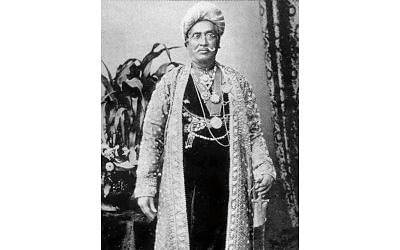Nawab Bahadur Abdul Latif

Nawab Abdul Latif
As a part of Corporate Social Responsibility (CSR), The Daily Star and Robi jointly initiated "English in Schools" programme 2 years ago and it is still running successfully among 1,000 listed schools. To cope up with the rapid pace of modernity and face the challenges of 21st century, the sole purpose of this initiative is to increase the number of English speaking people in Bangladesh. The joint scheme has already proved to be very effective medium and The Daily Star hopes to introduce some new and fresh ideas to increase the effectiveness of this project in the coming days, which will surely open a new horizon and boost the English language scope of the students. This initiative deserves encomiums as it is regrettable that after 1971 the importance of English in schools was completely diminished.
This very initiative of introducing English among the Muslims brings back the memory of Nawab Bahadur Abdul Latif (NBAL) who took a similar initiative in the mid-eighteen century.
We shall briefly examine the total degeneration of the Muslims in the Indian subcontinent in the early days of British rule.
The first step in the conquest of India by the British was undoubtedly the Battle of Plassey. A three-fold alliance among the Hindu banker Jagat Seth and his rogue candidate for the Murshidabad throne Mir Jafar and the British military commander Robert Clive sealed the fate of the Muslims on the battlefield of Plassey on June 23, 1757. Clive reaped an enormous personal fortune and was made virtual ruler of Bengal, Bihar and Orissa with Mir Jafar and Mir Kasim as his puppet Nawabs.
During the Governor Generalship of Lord Cornwallis the "Permanent Zamindari Settlement" of 1793 radically transformed the character of Bengal's rural relationships as the tax collectors, predominantly Hindus, became the owners of the land. The ultimate outcome was that, in about two years, the old Mughal aristocracy of Bengal were displaced by Hindu families -- the Roys, Sen and Tagores -- who led the westernisation of the society in Calcutta. By the outbreak of the mutiny in 1857, these families were so strongly attached to the British Raj that their loyalty proved critical in averting the spread of the mutiny to Bengal.
After 1857, when the wrath of both the British and the Hindus fell on the Muslims, their status was degenerated socially, financially and educationally. The situation was so lamentable that Viceroy Earl of Mayo thought it fit to appoint W.W. Hunter to examine the status of the Muslims. The report is a classic titled The Indian Musalmans, published in 1871.
As recorded in The Indian Musalmans: "A hundred and seventy years ago it was almost impossible for well-born Musalman in Bengal to become poor: at present it is almost impossible for him to continue rich" (p.150).
"It elevated the Hindu collectors who up to that time had held but unimportant post to the position of land holders, gave them a proprietary right in the soil, and allowed them to accumulate wealth which would have gone to the Musalmans under their rule" (Indian Musalmans, p.155). The status of the Muslims had degenerated to a level lower than the Hindu scheduled caste.
We now look at the role of Nawab Abdul Latif in the upliftment of the Muslims and the promotion of education, particularly English, among the Muslims of Bengal. His family ancestry can be traced to Khalid bin Walid of Arabia whose descendants settled in Faridpur, Bengal, during the Mughal rule in India. Born in 1828, he moved to Calcutta at an early age and was sent to Calcutta Madrassa, the great education institution founded for the benefit of the Musalman boys by the British Governor General Warren Hasting.
At school NBAL distinguished himself in the study of Arabic and Persian. The study of English, then an optional subject, held a peculiar fascination for him and the avidity with which he pursued the study of this language soon attracted the attention of his teachers. The orthodox Musalmans looked upon the study of anything appertaining to western learning with prejudice and that of English language with positive suspicion. So great was young Abdul Latif's keenness that even after class in the seclusion of his home he used to pursue his lessons in English.
By 1847 Abdul Latif, while still in his teens, was appointed by the government as assistant to one of the Ameers of Sindh. He worked in this capacity for about a year. He was next appointed a teacher in the Dhaka Collegiate School. Here too he served for a brief period. In 1847, an Anglo-Arabic class in the Calcutta Madrassa was opened for imparting instruction in English. In 1848, Abdul Latif was appointed Anglo-Arabic professor in-charge of this class.
In 1849, when he was 21 years of age, the Government of Bengal appointed him as a deputy magistrate. His great abilities began to manifest themselves. One cannot but marvel at the fact that although for nearly 36 years NBAL occupied no higher official position than that of a deputy magistrate, he had little difficulty in carving a place for himself as the leader of the Musalmans of Bengal.
Early in life NBAL realised the lamentable condition to which Musalmans had unfortunately been reduced, chiefly owing to the educational backwardness of the community. Realising the evil affects of the exclusiveness of the Muslim community, anxious to imbue its members with a desire to interest themselves in western learning and progress, and give them an opportunity for cultivation of social and intellectual intercourse with the best representative of English and Hindu society, NBAL founded the Mohamedan Literary Society (MLS) in April 1863. By holding discussions, meetings, lectures and annual conversaziones at the Town Hall, the Society helped to raise the Muslim intellect and lead it to the path of advancement.
The Mohamadan Literary Society gave a remarkable impetus to the cause of Mohamadan advancement throughout India. In every direction in which it worked, it imparted a new tone to Mohamadan thought and feeling. It never ceased to bring to the notice of successive administrations, the wants and grievances of the Mohamadan community in regard to education, legislation and other cognate matters affecting the well-being of society. The Society was the precursor of similar institutions in other parts of India. It did not take long to attract the favourable notice of the highest officials in this country and in England by the good work it was doing in the cause of advancement and progress.
The Society's conversaziones, which used to be held regularly year after year, were attended by the viceroy, the commander-in-chief, the lieutenant governor, other high officials, ruling princes, zamindars, noblemen and representatives of all branches of learning and all classes of the community.
Since its establishment in 1863 the annual conversazione of the Society was held regularly at the Town Hall under the personal supervision of its Founder Secretary Nawab Abdul Latif till his death in 1893.
Finally in 1885, Nawab Abdul Latif was appointed as prime minister of Bhopal for just three months.
The government, in recognition of his meritorious services, honoured him with titles and decorations from time to time. In 1877, at the Imperial Assemblage, at Delhi, Viceroy Lord Lytton conferred upon him the title of "Khan Bahadur" and presented him with an "Empress Medal." In April 1880, Lord Lytton conferred upon him the high title of "Nawab." In 1883, Viceroy Lord Ripon honoured him with a "Companionship of the Most Eminent Order of the Indian Empire." In 1887, on the occasion of Queen Victoria's Jubilee, Viceroy Lord Dufferin conferred upon him the highest Mohamadan title of "Nawab Bahadur."
Having accomplished his mission in life, Nawab Abdul Latif expired on July 10, 1893.

 For all latest news, follow The Daily Star's Google News channel.
For all latest news, follow The Daily Star's Google News channel. 



Comments